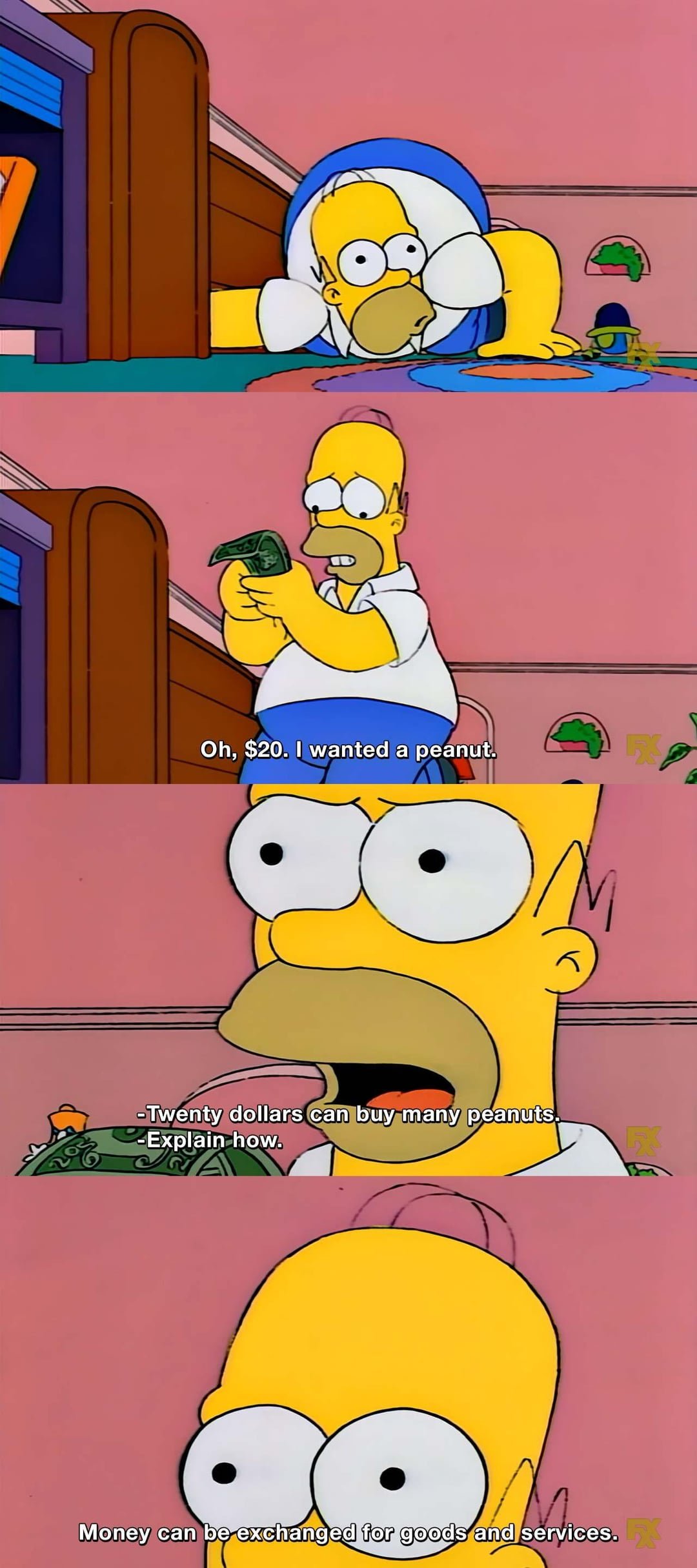Oh hey, also the same thing with environmental issues
Yup. Programmes that have experimented with giving homeless people hundreds in no-rules cash find that within a couple of months most of them have secured accommodation and reconnected with family and friends. After a while the majority are in paid employment.
Who would have guessed that the most of the problems of extreme poverty could be solved with money?!
Next you’re going to tell me you can solve homelessness by giving people housing
Yes. But in more controversial news, you can solve hunger with… money!
It’s like giving people money empowers them to choose to fix their problems, most important ones first.
The surprising bit is that drug use rates drop substantially if people can cope with everyday life.
Drug use rates also decrease with accessible medical and mental health care. It’s almost like treating the cause works better than punishing the symptoms…
Well then, seems to me like money itself is the issue
Who’d’ve thunk it?
Problem: poverty.
Solution: money.Problem: no money
Solution: you guessed it it’s money
Problem: money
Solution: get rid of money.
Obviously, we should stop people from sleeping outside by adding pikes everywhere. That’s how you solve the problem!
But I’m using these bootstraps, they can go find their own!
I almost thought this was going a different way. I’m happy to be wrong.
I imagine some capitalist, right-wing fucker is screaming at their screen going “nu-uhhh” and furiously typing that you’re wrong despite having done zero research.
I’m employed, and I live like I’m in poverty. As much as I want to lift up the homeless, I would also appreciate fair wages for the employed.
Since rent/housing has gone insane, I’m having a hard time making things work on the money I’m making. I’m well over the “poverty” line and I can’t afford to put fuel in my car and buy name brand products, even if I wanted to. Products like… Idk, Campbell’s.
I knew such a right wing fucker had to exist, so I found him for you: https://youtu.be/lNgqNE78N1g
Guy runs two channels, both animated right wing propaganda. That’s the more serious of the two, the other has shit like this: https://youtu.be/X6Xe3SGUH6A

But to take it a bit further, high capacity public infrastructure can go a long way towards improving the lives of low income working people.
Trains, buses, and subways can eliminate the need to own and maintain a car. Public housing can get people off the street, where they won’t be at risk of harm from interpersonal violence or exposure to severe weather. Public education and public health care have more benefits than I could list.
At an individual level, “Just give people money” is an immediate and useful generic panacea. But at a more macro level, geographic access to grocery stores and clinics and colleges and bus stops and permanent homes and factories matter just as much.
Clearly, the Venn of those who’re empowered to make those changes and those who’ve played at least a couple hours of SimCity is two estranged circles.
It needs to be quality of those things, as well. And they know this. It’s designed to keep us too tired, broken physically and mentally to get off the wheel, and not just under it, either. There’s enough for everyone, just some few want to hoard it like decades worth of paper, not because it may come in handy, just because bloodsport is still entertainment, no matter how well they dress it.
It needs to be quality of those things, as well.
Oh absolutely. I have a bus stop on my corner, but it only picks up every 2 hours and then doesn’t go to downtown.
There’s enough for everyone, just some few want to hoard it like decades worth of paper, not because it may come in handy, just because bloodsport is still entertainment, no matter how well they dress it.
Kropotkin was saying it over a century ago. Bread Book, baby.
People periodically ask how a country like Denmark or New Zealand or Japan can have such high standards of living relative to their individual incomes. Or why a country like the UK or Saudia Arabia can be so rich and yet appear so poor from a street level view.
So much boils down to who has access to quality infrastructure.
True enough. With apologies to mlk2, I may not get there with you, but I’ve seen it in my dreams. I hope we get there, with or without me. If you do, guard it vigilantly.
But to take it a bit further, high capacity public infrastructure can go a long way towards improving the lives of low income working people.
Trains, buses, and subways can eliminate the need to own and maintain a car.
The real problem is zoning. If the density is high enough (and mixed-use enough), people can just fucking walk places whether you’ve got public transit or not!
Even in areas where we have zoned for dense real estate, we’ve built these four lane boulevards with barely a crosswalk between them.
At some level, we could use a little zoning. Pedestrianization isn’t going to happen via the free market.
I Sweden a liberal lobby group suggested “build apartments without kitchens” for poor people. It is so fucking dystopian.
Wat, why? What is the idea here?
You could build more affordable housing if you lowered building standards like demanding there must be a kitchen.
WTF, just build an apartment out of tiny houses and make sure there are common and private areas for people to relax in. Tack two together for family apartments. You can build a really small, cheap house without removing the kitchen.
Like, okay, if they were arguing for bachelor dorms, where each person has their own bedroom but they share a common area with showers, bathrooms and kitchens, then okay. But that’s not gonna work for couples, they’re gonna at least want their own bathroom; and families with children? Forget it. They’re gonna want their own kitchen and bathroom so they don’t have to wander out into a common area in the middle of the night in their underwear because their baby wants milk and won’t stop screaming if it doesn’t get warm milk.
I’d be okay with a tiny studio apartment with just a separate bathroom, even sans closet, as long as I have a functional kitchen with space for a full fridge (not those BS “bachelor” units with a barely functioning kitchenette).
The bachelor fridges are fine in communities not designed entirely for cars.
How do those things equate? I don’t get it.
Isn’t that just a hotel room?
Housing without kitchens has come up in modern history multiple times: https://99percentinvisible.org/episode/the-frankfurt-kitchen/
their designs just had single family homes with kitchens. But Marie Howland convinced them to sketch in small groups of kitchen-free houses, each with access to a shared kitchen, where residents would take turns working.
Austin thought it could be a city of kitchen-less houses. And she thought that the food could to each house on a system of underground trains. She drew maps upon maps, and tons of floor plans. She published her ideas in a journal called ‘The Western Comrade’ and even applied to patent her underground food train idea.
But the kitchen-less house movement still didn’t die. In England, the urban planner Ebenezer Howard actually incorporated kitchen-less homes into some of his “garden city” communities. He called these homes “cooperative quadrangles.” They had a shared courtyard and shared kitchen, surrounded by smaller kitchen-less dwellings.
When I took out a loan from my bank I swear to God for the first 6 months they were absolutely terrified of my spending habits and I got emails daily about how to spend and and how my spending habits were reckless. I’ve made every payment I don’t understand what f****** high horse they were coming from.
And on the flip side, when you’re not spending much money, you’re being accused of ruining the economy. Especially if you like avocados.
I’m gonna be that guy, since there are a lot of comments saying that “research suggests”.
Source?
I do fully agree with it. The drug trade is impossible to stop, but decriminalisation and funding of healthcare will help many that are homeless. From tackling these aspects, helping those that want to free roam to do so safely, basically leaves you with those that just need some money to get back on their feet.
But, even if these things seem obvious, they need a source if you’re going to speak from a position of fact.
Assuming the link works, this is a great resource of research papers on the topic - https://www.givedirectly.org/cash-evidence-explorer/
Here’s one local to me. Slightly old but quite relevant.
There are a bunch of interacting factors, too. Something like 10% of the homeless are chronically homeless and don’t really have good prospects of being able to give themselves housing stability even if given money. This population in particular seems to be better served by the “Housing First” movement where they are given homes and supervised so that they can then get the treatment they need relating to substance abuse, mental health, etc., from a position of at least having a place to go home to. Here is a summary with citations to studies.
But for the housing insecure people who are at risk of becoming part of the 80% of the homeless experiencing transient homelessness, or the already homeless in that category, dropping money in their lap might be an effective way to improve their lives permanently, putting them on a better trajectory. From what I’ve seen of the reporting of very recent studies, many of which were complicated by the fact that a pandemic happened right in the middle of the experiments, there is some evidence that giving money directly is helpful. But there’s open questions about whether it should be a lump sum, whether big numbers ($500+/month) result in something different from small numbers ($25/month), etc.
So yeah, I think even if we start from the assumption that giving directly is more effective than in-kind support like free/subsidized food or healthcare or housing or childcare, or treatment for mental health or substance abuse, we have to figure out which populations are best served by which intervention, and whether temporary/time limited programs are as cost effective as long term commitments, etc.
There have been hundreds of UBI studies at this point. Most of them with headlines in major papers. They all say the same thing.
Source?
There are other comments on this chain hours older than mine with sources. But sure, I’ll take a jab at it just for you.
The pilot programs have created scores of stories like Everett’s about how a small amount of money led to massive change in a recipient’s life. And a growing body of research based on the experiments shows that guaranteed income works — that it pulls people out of poverty, improves health outcomes, and makes it easier for people to find jobs and take care of their children. If empirical evidence ruled the world, guaranteed income would be available to every poor person in America, and many of those people would no longer be poor.
We’ve known for years, decades really.
That’s true, but my original point is that we shouldn’t state facts without sources. Otherwise, it’s very easy to sneak falsehoods, or to twist that research to fit a narrative.
Except this really is well reported. It’s not obscure or contested in science. It’s not really what asking for sources is supposed to be for.
Ok but have we tried telling them about Jesus instead of giving them money? They’re poor because they’re bad. If you give them money then they’ll use it to be bad again, which will keep them poor. /s
Fun story. My FIL couldn’t afford to travel to our wedding. I loaned him 3k for travel and a tux and hotel fare for his family. That Christmas we got one of those books from Ollies titled “500 ways to save money” from him. I lost the fight to send it back with torn out pages and a note that would say “1-500. Don’t lend money to family”.
Amazingly shitty.
Idk… Maybe he knew he sucks with money so couldn’t offer his own wisdom on the topic, but wanted to help his kid avoid his mistakes however he could
no that would be socialism, silly
The wealthy’s deathgrip on their money is phenominally strong
Noo poor people will just use up the money if we give them some!!1!
Then we’ll have to give them more pie, and they’ll just eat the pie! Eventually they’ll eat all of the pie and the poor rich folks won’t have any pie :(
Yeah, I’m still salty about that vile skit.
Money is religion now. It’s scary to be rational about it. There’s a dogma and that’s that. Any other way and we freak out.
Ok reusing clothes is not a bad thing. Even in a perfect world with no poverty, it’s important to reuse.
Works the same with the climate crisis, amazing!
Cereal for dinner sounds pretty reasonable, what do you think?
Financial education, it’s practically intentional that we don’t learn proper finance management and if you’re family didn’t manage money well (poor or rich) you’ll struggle to use any money you get effectively when your out on your own












